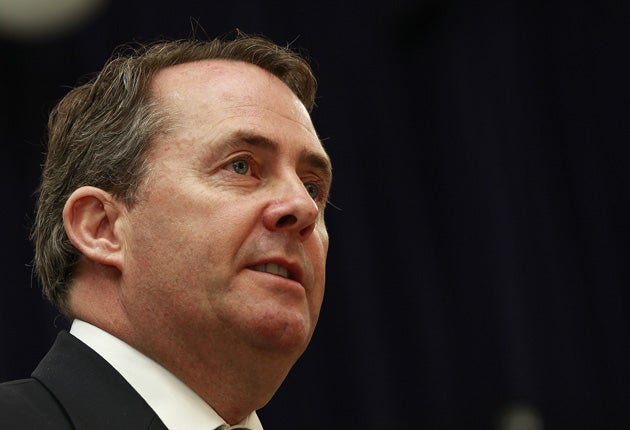Cuts will leave Britain's military stronger, says Fox

Your support helps us to tell the story
From reproductive rights to climate change to Big Tech, The Independent is on the ground when the story is developing. Whether it's investigating the financials of Elon Musk's pro-Trump PAC or producing our latest documentary, 'The A Word', which shines a light on the American women fighting for reproductive rights, we know how important it is to parse out the facts from the messaging.
At such a critical moment in US history, we need reporters on the ground. Your donation allows us to keep sending journalists to speak to both sides of the story.
The Independent is trusted by Americans across the entire political spectrum. And unlike many other quality news outlets, we choose not to lock Americans out of our reporting and analysis with paywalls. We believe quality journalism should be available to everyone, paid for by those who can afford it.
Your support makes all the difference.Britain's military will have to accept cuts imposed "ruthlessly and without sentiment" in the current harsh economic climate, Liam Fox warned yesterday in a keynote speech on Strategic Defence Review. However, the Defence Secretary insisted that the result of the radical overhaul would leave the UK's security stronger, with a "clean break" from Cold War-legacy thinking, and also prepare the forces for an exit strategy from the war in Afghanistan.
"Resources are tight for the country as a whole and defence is no exception. This review must be anchored in the art of the possible," he told the Royal United Services Institute in London. "We cannot insure against every imaginable risk and so we need to decide which risks we are willing to meet and which risks we are willing to take.
"We face some difficult, delicate and politically charged decisions. There are competing priorities, risks to manage and budgets to balance. We must act ruthlessly and without sentiment. It is inevitable that there will be the perception of winners and losers as we go through this process. But defence as a whole will, and must, come out in a stronger position."
Results of consultations on the Strategic Defence Review, overseen by the National Security Council, would be published in a White Paper by the end of the year, said Dr Fox. However, he acknowledged that decisions were for the medium and long term. "Contractual and structural commitments on personnel and equipment mean that the budget is very heavily committed for each of the next four years, severely limiting our room for manoeuvre."
Dr Fox said the reason the government had excluded the Trident system from the Strategic Defence Review (SDR) was for "value for money" considerations and also because "there needs to be a deterrent at all times". In the current state of technology, Trident was "the most cost effective [system] that we want, a continuous-at-sea nuclear deterrent," he added.
Dr Fox sparked controversy by saying, prior to a visit to Helmand, that British forces should be pulled out as quickly as possible from what he described as a "broken 13th-century state".
David Cameron, who made his first visit to the country as Prime Minister last week, set out his Government's strategy on the war in the Commons yesterday, saying he will accelerate the process allowing the forces to start coming home.
However, he will not set an "artificial timetable" for the withdrawal and will follow the US-led process of reviewing the situation at the end of the year and start reducing numbers from July 2011.
Sir Richard Dannatt, the former Army chief now advising the Tories, has spoken of an "exit strategy". He said: "The future of the country must be in Afghan hands."
Dr Fox stressed yesterday that Afghanistan, the most challenging foreign and defence policy issue facing the country, remained the Government's "top priority" and said the campaign remained "vital" to the UK's national security as well as to global stability.
Dr Fox said that he expected to see "significant progress" by the end of the year. He continued: "But counter-insurgency requires strategic patience and we are committed to seeing the mission through to resolution, creating a stable enough Afghanistan to allow the Afghan people to manage their own internal and external security.
"This is no time for us to lose our nerve and we must find the language to persuade the British people to stick with us. By the end of the year I expect that we will be able to show significant progress, consolidating Isaf (International Security and Assistance Force) control in central Helmand and accelerating the training of the Afghan national security forces."
Join our commenting forum
Join thought-provoking conversations, follow other Independent readers and see their replies
Comments